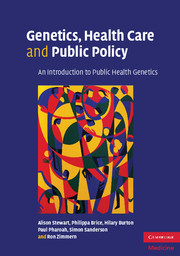3 - Fundamentals of genetic epidemiology
Published online by Cambridge University Press: 19 January 2010
Summary
An understanding of genetic science does not, on its own, provide a sufficient basis for identifying or developing clinically useful applications of genetics. Epidemiological information is also essential. We must, for example, know the frequencies of potentially relevant genetic variants in different populations, assess the strength of proposed associations between genetic variants and disease risk, and understand the quantitative contribution of genetic factors to the incidence and prevalence of diseases in populations.
Epidemiology can be defined as ‘the study of the distribution and determinants of disease frequency’ or more simply, ‘the study of the occurrence of illness’. In this chapter, we present a brief overview of relevant general epidemiology before concentrating on the details of genetic epidemiology. We are using the term ‘genetic epidemiology’ not in the narrow sense of statistical genetics, but to describe the study of genes and disease in populations, the design of epidemiological studies, and assessment of the impact of random variation, bias and confounding on their results. This first section focuses on concepts of causation and association, measuring the occurrence of illness, the design of cohort and case–control studies, and an introduction to the concept of interaction.
An overview of classical epidemiology
Causation and association
Studying and measuring the effect of exposures is a primary goal of epidemiology. An exposure can be any factor that may be related to disease risk; for example, the family history of disease or a lifestyle factor such as cigarette smoking.
- Type
- Chapter
- Information
- Genetics, Health Care and Public PolicyAn Introduction to Public Health Genetics, pp. 65 - 105Publisher: Cambridge University PressPrint publication year: 2007



